Discover mindful mediations, yoga with four-legged friends, sound baths, herb gathering, and more
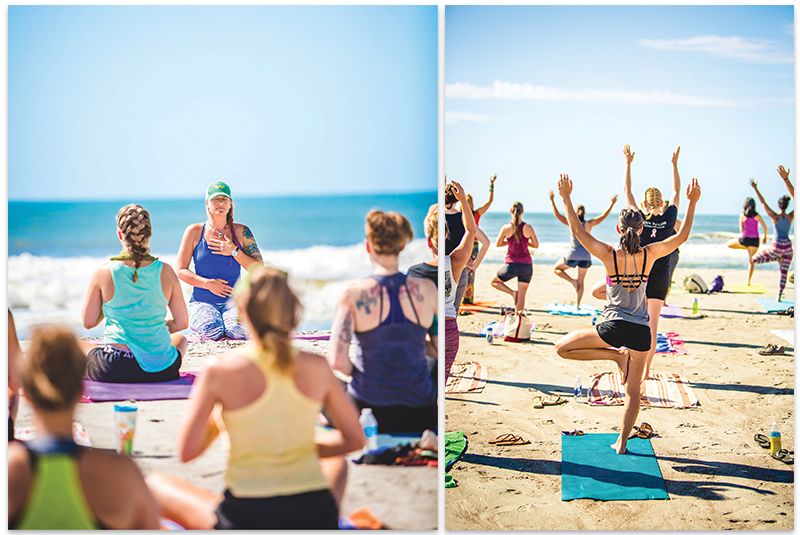
(Left to right) Serenity Tree Yoga offers classes at Folly and other area beaches starting in March, with pop-ups throughout the year.
Down-dog at the Beach: Serenity Tree Yoga
Growing up, Melora Morgan practiced yoga with her mom, who taught her the muscle-stretching, stress-relieving poses that serve her to this day. So when she started Serenity Tree Yoga in 2013, she wanted to make her classes as accessible to as many people as possible. “The more people doing yoga, the better off we all are,” Morgan says.
Offering classes at the beach was a no-brainer, practically speaking: Rookies often feel comfortable in an outdoor environment, and moms can practice while their kids play in the sand. “It’s very open, all ages and all levels,” she explains. Plus, there’s no denying the allure of the waves. “The earth energy is grounding, and the sound of the ocean is always very relaxing,” she says. “And on those really hot summer days, you can jump in the water after practicing.”
Morgan suggests bringing a cheap yoga mat for the sand, as well as a big beach towel or picnic blanket. Regular classes will start in March, but be sure to follow on Instagram for info on pop-up classes throughout the year.Folly Beach, Charleston Harbor Resort, & other outdoor locations on a pop-up basis. Donation-based (pay what you can). @serenitytreeyoga; serenitytreeyoga.com
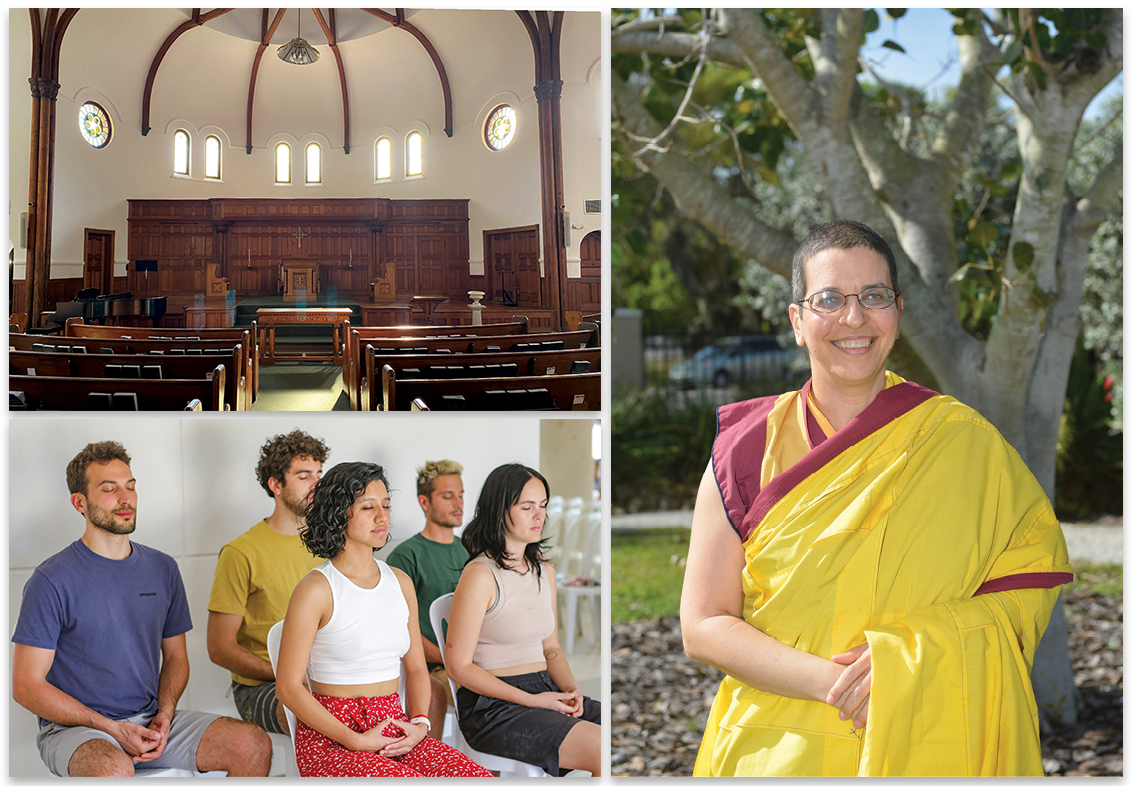
Each class offers two guided meditations and practical methods to keep the mind peaceful; (right) teacher Kelsang Jangchen; (top) participants meet at the Circular Congregational Church on select Saturdays at noon. Free parking is available.
Be Still: Kadampa Meditation Sessions
We all want peace, regardless of any religious affiliation, says Kelsang Jangchen, a Buddhist nun and resident teacher at Kadampa Meditation Center South Carolina in Columbia.
In fact, the nature of our mind is to be still, she explains, and sitting in meditation can help us connect with that. “As we let go of distraction and habitual negative states of mind, what we are left with is peace.”
Jangchen and fellow teacher Frances McLeod bring that message to the Circular Congregational Church during regular sessions, where they offer cues to disengage the mind and focus on breathing. Participants don’t need to register, nor do they need experience. Classes run about an hour and 15 minutes and consist of two meditations and a teaching on topics, such as anger. Circular Congregational Church, 150 Meeting St. Saturday, January 7 & 21 (see website for more), noon; $12. meditationinsouthcarolina.org
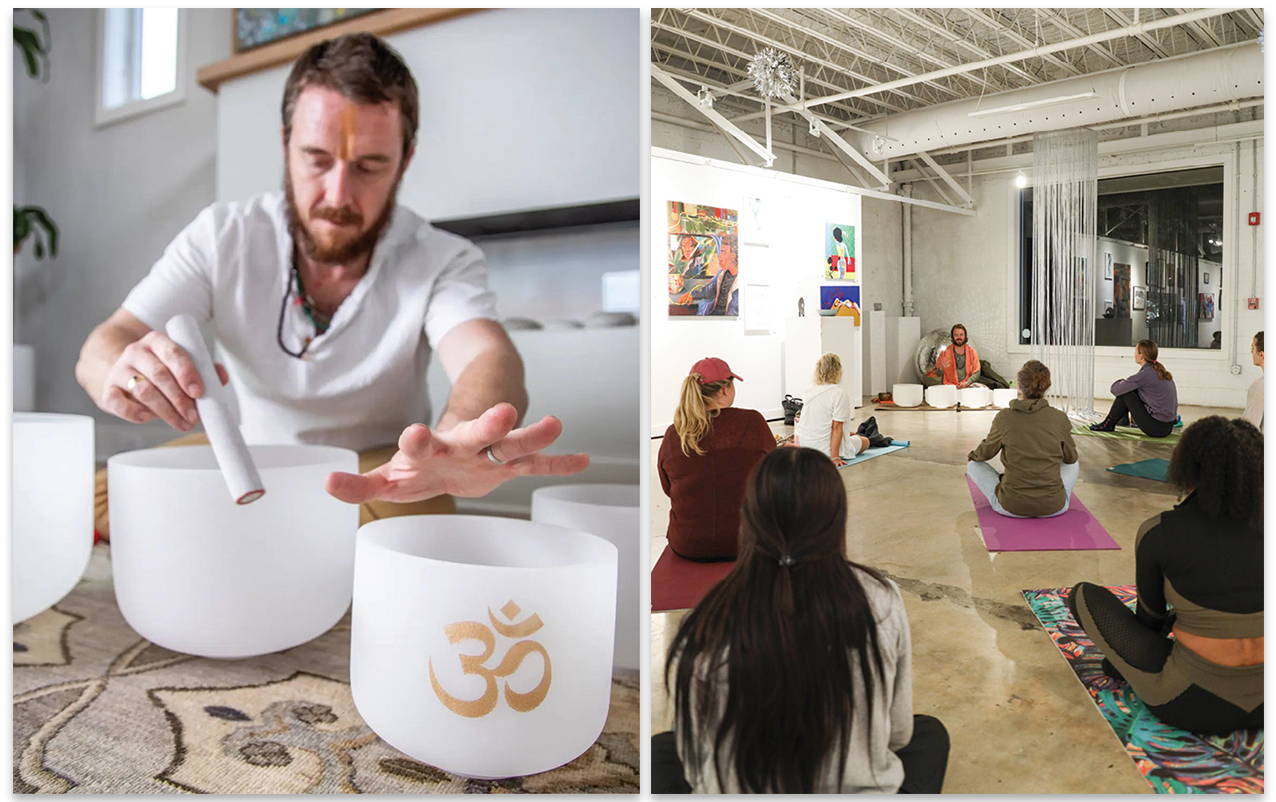
Christian McClellan plays crystal singing bowls to create sound waves that resonate with our chakras, or energy centers, to induce deep relaxation. Allowing the mind and body to soften into this state is very restorative, says McClellan. (Right) Redux Contemporary Arts Center hosts the sound baths in its exhibition space most Wednesdays.
Take a Sound Bath: Sacred Soma
If the thought of sitting still in meditation for a spell seems daunting, consider a sound bath. Energy worker Christian McClellan, who facilitates the experience at Redux Contemporary Art Center most Wednesdays, explains that the crystal bowls he plays are tuned to resonate with our chakras, or energy centers, inducing a meditative state. All participants have to do is show up with a mat to lie on for 45 minutes (a blanket is nice, too).
Sound baths are particularly useful for people who have trouble with mindfulness practices, says McClellan. “The sound takes the space of all those mental patterns, so we can bring ourselves into a bigger, more grounded energy than our own.” He notes that the vibe changes based on the exhibition in the gallery space; for instance, a recent show of textile and fiber art lent the experience a warmness. “It’s wonderful because it brings in this overlap between inner work and creativity.” Redux Contemporary Art Center, 1056 King St. Wednesdays, except during exhibition changeovers; 7 p.m.; donation-based. sacredsomaspace.com
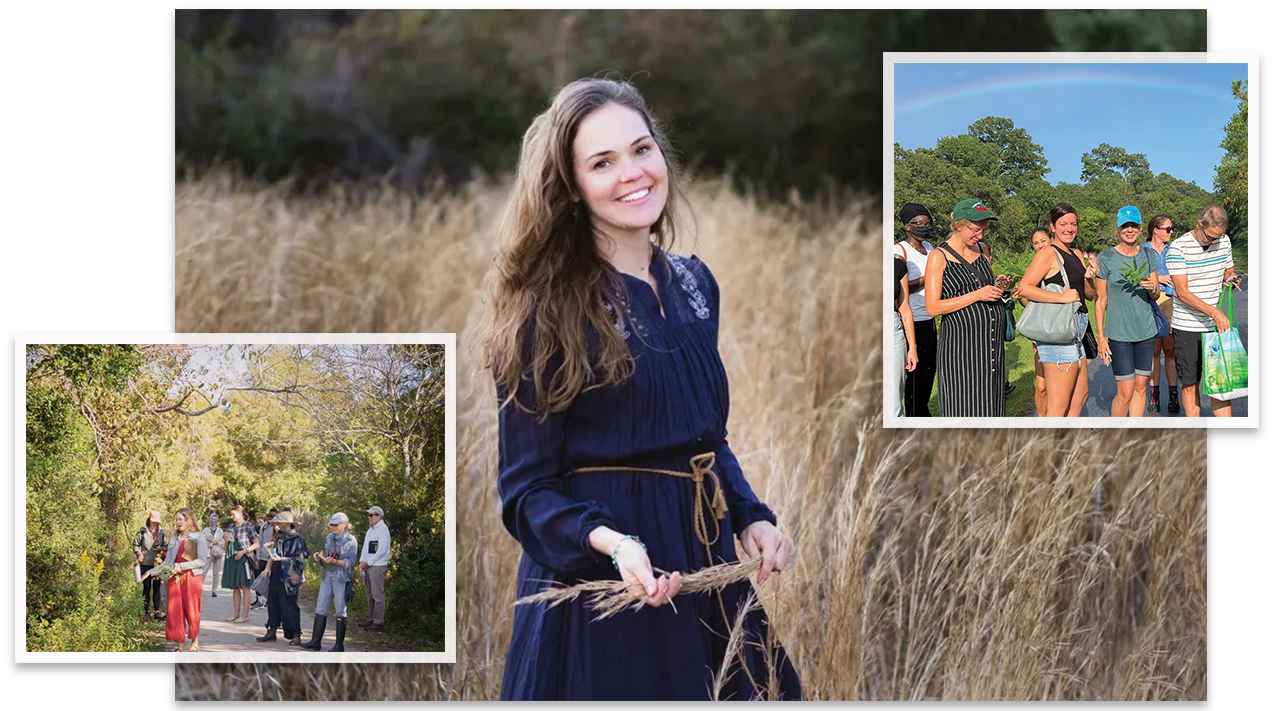
Botanist April Punsalan (above middle) shares her knowledge of flora and its various uses in online classes and during foraging strolls in Hampton Park.
Harness the Healing Power of Herbs: Yahola Herbal School
Of the 3,510 plants that grow in the South Carolina coastal plain, an estimated 100 of them are used for medicine or food. But botanist April Punsalan is out to change that by teaching how to make the most of the flora that surrounds us. For instance, Punsalan uses the leaves of Eastern Red Cedar—a powerful antimicrobial—in a steam facial for sinus infections and to keep the respiratory system healthy during cold and flu season.
In her new virtual monthly series, Punsalan covers three herbs, including how to forage and use them as food, medicine, crafts, and body or beauty care. Students who complete a monthly challenge, say making dandelion fritters or fruit leather, will receive a gift from her apothecary. “The goal of the program is to get people to reconnect to the earth through the use of wild herbs,” she says. For would-be foragers who want less of a commitment, Punsalan offers “wild herb strolls” in Hampton Park on the second Thursday of each month, from April to November. More serious herbalist students should inquire about her intensive program that begins in September. Monthly membership to the virtual “In Season” program, $25. Hampton Park strolls, free (register through Charleston Parks Conservancy: charlestonparksconservancy.org). yaholaherbalschool.com
Know Your Flora Video: Watch Punsalan share her favorite plants and their uses
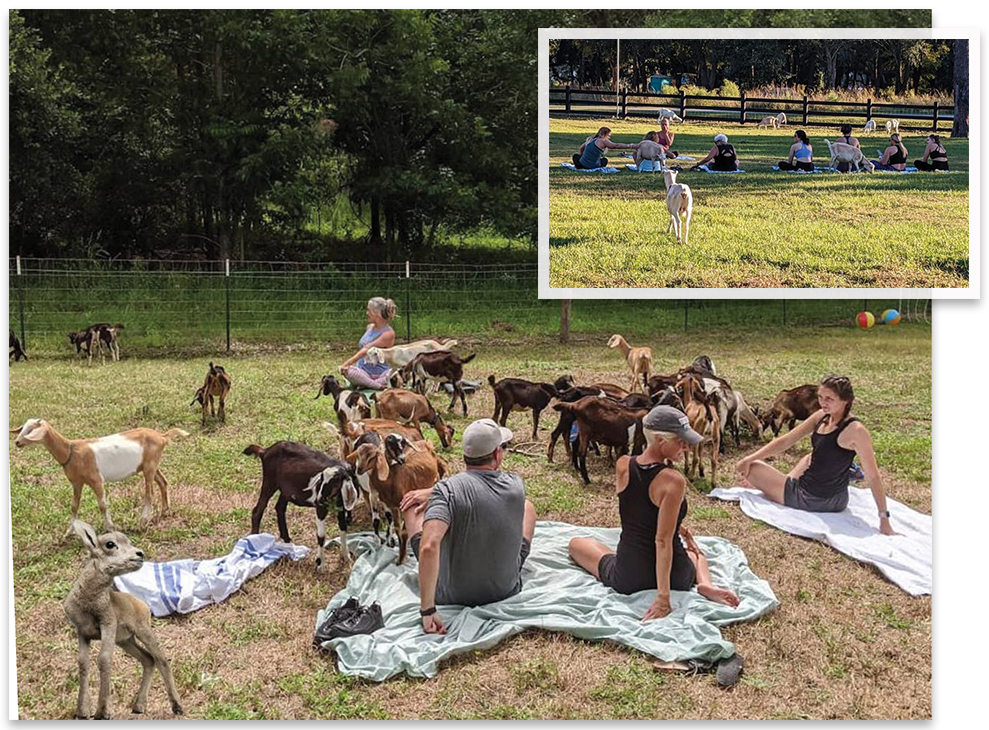
The animals are offered a treat, which encourages them to mingle with the yogis, but the goal of goat yoga is to experience the farm and connect with nature. Classes are held every weekend.
Do Goat Yoga: The Goatery at Kiawah River
Come for the goats, stay for the yoga. While animals are a big draw at The Goatery at Kiawah River, its weekend yoga classes held outdoors are more about connecting with nature. “We do guarantee a goat interaction for anybody looking for that,” says co-owner Missy Farkouh. “But we welcome everybody, no matter what their comfort level is with animals.” Participants need only bring themselves—mats and towels are provided—for a 45-minute vinyasa flow. “What makes yoga outdoors so special is really your connection with nature and even though the farm is noisy, it’s not your phone dinging; it forces you to decompress a little bit,” she says. After class, yogis are invited to visit the chicken tractor and take home fresh eggs. Cute alert: the next batch of kids are due March 1. The Goatery at Kiawah River, 3883 Betsy Kerrison Pkwy., John’s Island. Fridays at 5 p.m., Saturdays & Sundays at noon; $25. goatsaregood.com
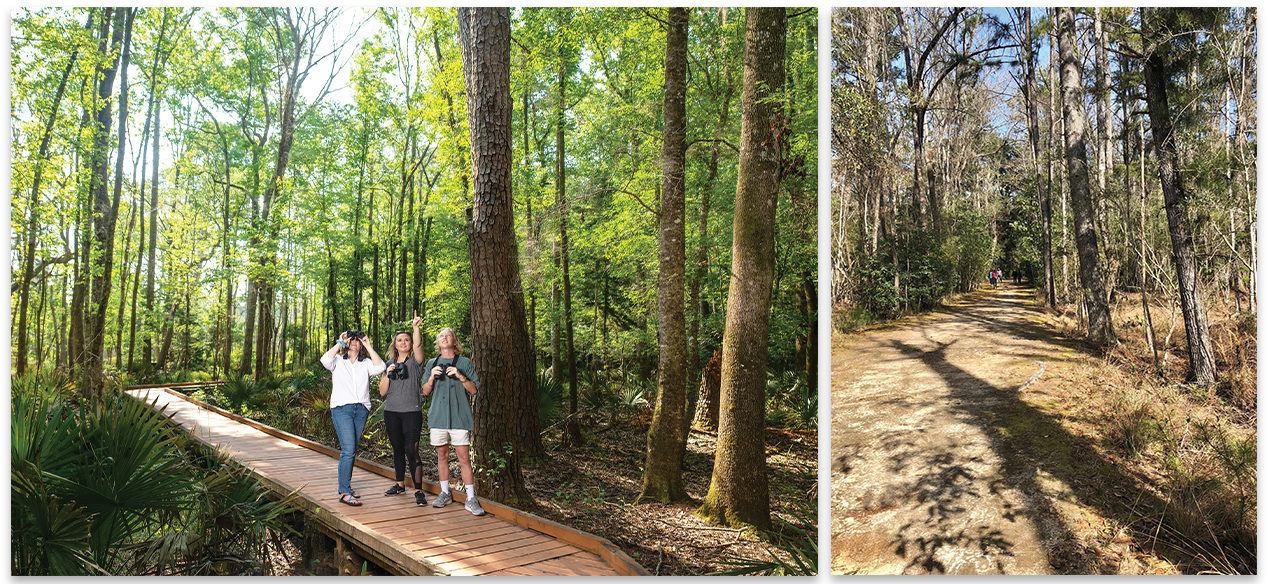
The higher oxygen levels in a forest can reduce blood pressure and heart rate.
Walk in the Woods: Forest-bathing Fridays
Japanese researchers have found that spending time in the woods can reduce stress, anxiety, anger, and depression; strengthen the immune system; boost cardiovascular health; and improve sleep patterns. No surprise, you say? Then put down your phone and join naturalist Kristina Wheeler at Caw Caw Interpretive Center for shinrin-yoku, or “forest-bathing,” this month.
Rather than racking up steps, the practice is to simply experience nature through the senses of sight, hearing, smell, and touch. Just being in a forest can reduce blood pressure and heart rate, thanks to a higher oxygen level than in urban environments and the presence of natural oils called phytoncides produced by plants, particularly evergreen trees, which Caw Caw has in spades. Wheeler incorporates light stretching and breathing as well as grounding practices into a guided two-hour, mile-long nature walk. “Potential side effects may include improved mood, improved circulation, interest in something new, and spontaneous euphoria,” she adds. Caw Caw Interpretive Center, 5200 Savannah Hwy., Ravenel. Friday, January 13, 20, & 27, 10 a.m.-noon; $9. ccprc.com
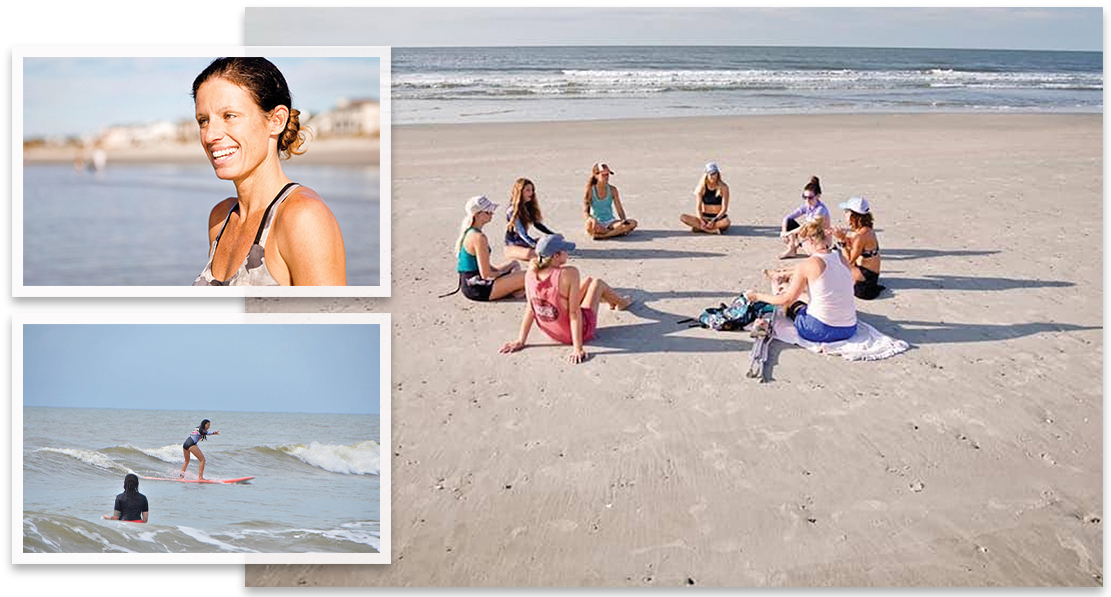
Waves 4 Women offers therapeutic surf lessons to women dealing with loss, depression, or anxiety. Director and co-founder Erin Jones (inset top left) says the goal of the Folly Beach nonprofit is to empower participants in their daily lives and build community.
Get Surf Therapy: Waves for Women
To anyone who’s ever caught a wave, surfing can be a great stress reliever. But for so many, the ocean’s healing powers can seem unattainable, especially those who struggle with depression, anxiety, or everyday life issues. Enter Waves 4 Women: the Folly Beach nonprofit aims to empower women to build wellness and community through surfing. Think of it as a wellness coaching/surf lesson hybrid in a series of four clinics.
Before stepping foot on a board, participants discuss a skill, such as mindfulness or going outside of your comfort zone. After instruction in the water, the surfers debrief. “We ask how they can pull this lesson into their daily lives,” explains director Erin Jones. Most women who sign up have little to no surfing experience, but all skill levels are welcome (as are men, for individual sessions). Once the sessions wrap, participants are encouraged to attend beach meet-ups every Friday during the season, as well as open surfs. “The goal is to keep people connected,” says Jones, who hopes to expand the largely summer program to year-round. Folly Beach. Saturdays, 7:45-10 a.m.; Tuesdays, 9-11 a.m.; or Thursdays, 5:30-7:30 p.m. $400. waves4women.org
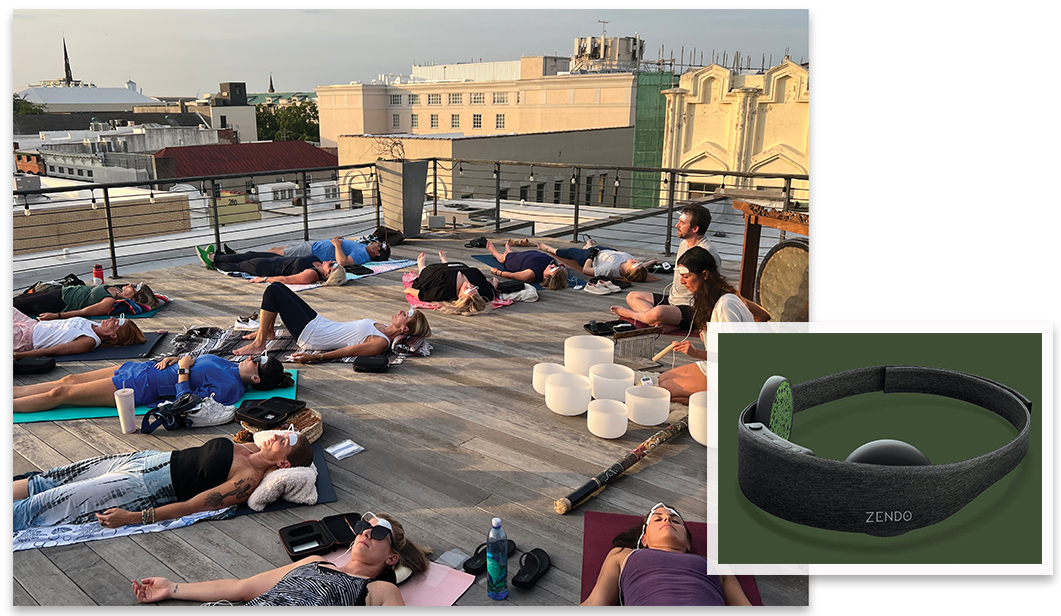
Zendo is a wireless, wearable neurostimulaition device that helps nudge users into a mediatative state.
Embrace Technology: Still X Zendo
A meditation practice doesn’t come easy, but a neuroscientist and psychiatrist/internist at MUSC have come up with a solution to give it a jump-start: Zendo is a wearable neurostimulation apparatus that essentially nudges your brain into a state of calm. The start-up behind the invention has partnered with nonprofit Still Soul Collective (formerly Still Soul Studio) to open a shared space this winter that will offer mediation classes using the device. “It really drops you more deeply into your meditation, especially for beginners,” says Still Soul founder Kelly George. “A lot of early practitioners don’t feel the impact of mediation, and this helps you get into it.” 155 King St. Suggested donation pricing: Drop in for $12; five-class pass for $50; 10 class pass for $80; $95 per month unlimited membership. Zendo rental, $30. stillsoulstudio.com; zendomeditation.com
Kailee Dimeglio; Amanda Bouknight; courtesy of Sacred Soma; Sarah MacDonald; April Punsalan; courtesy of "The Goatery at Kiawah River & courtesy of Waves 4 Women